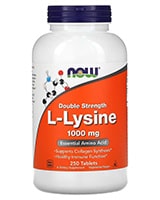

Lysine stands out as an indispensable amino acid, crucial for human health yet not naturally produced by the body. This makes it essential to source lysine from our diet. It underpins numerous physiological processes—from growth and tissue repair to the production of antibodies, hormones, and enzymes. The significance of lysine extends across various aspects of health, including immune function, bone health, and skin integrity. With its broad impact, understanding and ensuring adequate lysine intake becomes paramount for anyone looking to optimize their health and well-being. This article delves into the top reasons to ensure lysine is a prominent part of your diet.
Boosts Immune System Function
Lysine plays a vital role in the immune system’s health. It’s essential for the production of antibodies, which are crucial for fighting off infections and diseases. By ensuring you have enough lysine in your diet, you’re directly supporting your body’s ability to defend itself against harmful pathogens. This amino acid helps enhance the immune response[1]He, X., Wei, Y., & [Additional Authors]. (2023). Lysine vitcylation is a novel vitamin C-derived protein modification that enhances STAT1-mediated immune response. bioRxiv. https://doi.org/10.1101/2023.06.27.546774, providing a better shield against common illnesses and infections.
Supports Collagen Production and Skin Health
Collagen is the most abundant protein in the body, providing structure to skin, bones, and connective tissues. Lysine is indispensable for collagen production[2]Yamauchi, M., Terajima, M., & Shiiba, M. (2019). Lysine hydroxylation and cross-linking of collagen. Methods in Molecular Biology, 1943, 309-324. https://doi.org/10.1007/978-1-4939-9095-9_19. It helps in the repair of tissues and the healing of wounds. For skin health, this means more elasticity and faster wound healing times. Given its role in collagen synthesis, lysine is a key nutrient for maintaining youthful skin and the overall structural integrity of the body.
Promotes Heart Health by Lowering Blood Pressure
Emerging research suggests lysine may play a part in reducing high blood pressure[3]Vuvor, F., Mohammed, H., Ndanu, T., & Harrison, O. (2017). Effect of lysine supplementation on hypertensive men and women in selected peri-urban community in Ghana. BMC Nutrition, 3(1), 1-7. https://doi.org/10.1186/s40795-017-0187-6, a major risk factor for heart disease. While the exact mechanism is still under study, lysine appears to improve cardiovascular health by possibly influencing blood pressure levels. This makes lysine a nutrient of interest for those looking to support heart health through dietary means. However, it’s important to note that while promising, more research is needed to fully understand lysine’s role in heart health.
Helps Prevent and Manage Herpes Outbreaks
Lysine has been shown to suppress the replication of the herpes simplex virus[4]Griffith, R. S., Norins, A. L., & Kagan, C. (1978). A multicentered study of lysine therapy in Herpes simplex infection. Dermatologica, 156(5), 257-267. https://pubmed.ncbi.nlm.nih.gov/640102/, which causes cold sores and genital herpes. It competes with arginine, another amino acid that the virus uses to multiply. High levels of lysine can help reduce the frequency and severity of herpes outbreaks. For many people, lysine supplements have become a part of their management plan for controlling herpes flare-ups, highlighting lysine’s antiviral capabilities.
Aids in Calcium Absorption and Bone Health
Lysine is known to enhance calcium absorption and retention in the body[5]Civitelli, R., Villareal, D. T., Agnusdei, D., Nardi, P., Avioli, L. V., & Gennari, C. (1992). Dietary L-lysine and calcium metabolism in humans. The Journal of Nutrition, 122(11), 2107-2112. https://doi.org/10.1093/jn/122.11.2107, which is critical for maintaining strong bones and preventing conditions like osteoporosis. By promoting the absorption of calcium from the diet and minimizing its excretion, lysine helps ensure that calcium is efficiently used to strengthen bone tissue. This amino acid’s role in bone health underscores the importance of a lysine-rich diet, especially for individuals at risk of bone density loss.
May Reduce Anxiety and Support Mental Health
Recent studies have explored lysine’s potential to alleviate anxiety and support mental well-being. Lysine is believed to affect neurotransmitter receptors and might lower stress-induced anxiety and cortisol levels[6]Smriga, M., Ghosh, S., Mouneimne, Y., Pellett, P. L., & Scrimshaw, N. S. (2004). Lysine fortification reduces anxiety and lessens stress in family members in economically weak communities in Northwest Syria. Proceedings of the National Academy of Sciences of the United States of America, 101(22), 8285-8288. https://doi.org/10.1073/pnas.0402550101, a hormone associated with stress. This research suggests that lysine could be a valuable dietary component for managing stress and anxiety, making it a point of interest for future mental health interventions. While more research is needed to fully understand these effects, the current evidence points to lysine as a beneficial nutrient for mental health support.
Sources of Lysine
Ensuring adequate lysine intake is crucial for leveraging its health benefits. Lysine can be found in a variety of foods, making it accessible to both omnivores and vegetarians. High-protein animal products like meat, poultry, fish, and dairy are excellent sources of lysine. For those on a plant-based diet, legumes, beans, lentils, and soy products provide significant amounts of lysine. Additionally, nuts, seeds, and whole grains contain lysine, though in smaller quantities compared to other sources. Understanding these sources can help individuals plan a balanced diet that meets their lysine needs.
Conclusion
Lysine is an essential amino acid with a broad range of health benefits, from boosting immune function and skin health to supporting bone density and mental well-being. Its role in preventing and managing herpes outbreaks adds to its significance in nutritional health. By incorporating lysine-rich foods into your diet or considering supplementation, you can take advantage of these health benefits. Always consult with a healthcare provider before starting any supplement regimen, especially if you have specific health conditions or dietary concerns.
Buy Lysine Online Review Comparison Table
 L-Lysine | iHerb | 250 pills (1,000mg) | $18.37 |  Worldwide, AU | Visit Website >> |
References
| ↑1 | He, X., Wei, Y., & [Additional Authors]. (2023). Lysine vitcylation is a novel vitamin C-derived protein modification that enhances STAT1-mediated immune response. bioRxiv. https://doi.org/10.1101/2023.06.27.546774 |
|---|---|
| ↑2 | Yamauchi, M., Terajima, M., & Shiiba, M. (2019). Lysine hydroxylation and cross-linking of collagen. Methods in Molecular Biology, 1943, 309-324. https://doi.org/10.1007/978-1-4939-9095-9_19 |
| ↑3 | Vuvor, F., Mohammed, H., Ndanu, T., & Harrison, O. (2017). Effect of lysine supplementation on hypertensive men and women in selected peri-urban community in Ghana. BMC Nutrition, 3(1), 1-7. https://doi.org/10.1186/s40795-017-0187-6 |
| ↑4 | Griffith, R. S., Norins, A. L., & Kagan, C. (1978). A multicentered study of lysine therapy in Herpes simplex infection. Dermatologica, 156(5), 257-267. https://pubmed.ncbi.nlm.nih.gov/640102/ |
| ↑5 | Civitelli, R., Villareal, D. T., Agnusdei, D., Nardi, P., Avioli, L. V., & Gennari, C. (1992). Dietary L-lysine and calcium metabolism in humans. The Journal of Nutrition, 122(11), 2107-2112. https://doi.org/10.1093/jn/122.11.2107 |
| ↑6 | Smriga, M., Ghosh, S., Mouneimne, Y., Pellett, P. L., & Scrimshaw, N. S. (2004). Lysine fortification reduces anxiety and lessens stress in family members in economically weak communities in Northwest Syria. Proceedings of the National Academy of Sciences of the United States of America, 101(22), 8285-8288. https://doi.org/10.1073/pnas.0402550101 |

Leave a Reply